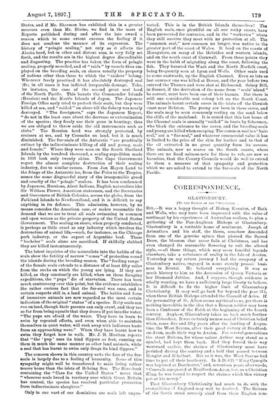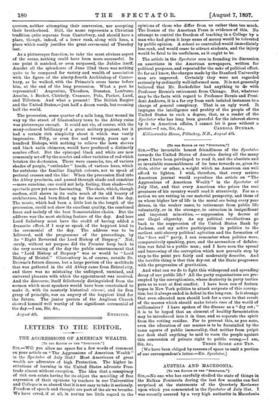CORRESPONDENCE.
GLASTONBURY.
[TO THE EDITOR OF THE "SPECTATOR. .
SIE,—It was a happy thought of Bishop Kennion, of Bath and Wells, who may have been impressed with the value of sentiment by his experiences of Australian realism, to plan a gathering of the Pan-Anglican Bishops at Glastonbury. Glastonbury is a veritable home of sentiment. Joseph of Arimathxa and his staff, the thorn, somehow descended from one of the genuine spines that pierced the Sacred Brow, the blossom that never fails at Christmas, and has even changed its seasonable flowering to suit the altered style, — all these things, which may seem fanciful legends elsewhere, take a substance of reality in the Isle of Avalon. Yesterday on my return journey I had the company of a Glastonbury native, engaged in some sternly prosaic busi- ness in Bristol. He believed everything. It was as much history to him as the Accession of Queen Victoria or her Diamond Jubilee. And, I suppose, though evidence is wholly wanting, we have a sufficiently large liberty to believe. It is difficult to fix the higher limit of Glastonbury Christianity. It may well go back far beyond the year 314, when three British Bishops attended the Council of Arles. If the personality of St. Alban seems mythical to us, yet there is nothing incredible in the idea that a Roman soldier may have been a Confessor of the Faith at the beginning of the fourth century. Anyhow, Glastonbury takes us back much further than E bbestieet. It was certainly no new seat of Christian belief when, some five and fifty years after the landing of Augus- tine, the West Saxons, after their great victory at Bradford- on-Avon, made their way to Avalon. For several generations the stout Britons, for whose valour Arthur may stand as a symbol, bad kept them back. Had they forced their way westward earlier, the shrines of Glastonbury must have perished during the century and a half that passed between Hengist and Ethelbert. But as it was, the West Saxons had time to put off their heathenry. In A.D. 635 "King Cynegils was baptised at Dorchester," and, seventeen years afterwards, " Cenwalh conquered at Bradford-on-Avon, but, as a Christian King, he was bound to respect the shrines which this victory put at his mercy."
That Glastonbury Christianity had much to do with the evangelising of England may well be doubted. The Britons of the South stood severely aloof from their English con.
querors, neither attempting their conversion, nor accepting their brotherhood. Still, the name represents a Christian tradition quite separate from Canterbury, and should have a place, though, indeed, of a lower rank, along with Iona, a place which easily justifies the great ceremonial of Tuesday last.
As a picturesque function, to take the most obvious aspect of the scene, nothing could have been more successful. In one point it matched, or even surpassed, the Jubilee itself. Amidst all the splendours of June 22nd there was nothing quite to be compared for variety and wealth of association with the figure of the ninety-fourth Archbishop of Canter- bury, as he walked, with the Primate's cross borne before him, at the end of the long procession. What a past he represented ! Augustine, Theodore, Dunstan, Lanham, Anselm, h Becket, Chichely, Cranmer, Pole, Parker, Land, and Tillotson. And what a present ! The British Empire and the United States,—just half a dozen words, but meaning half the world.
The procession, some quarter of a mile long, that wound its way up the street of Glastonbury town to the Abbey ruins was picturesque enough. It could not vie, of course, with the many-coloured brilliancy of a great military pageant, but it had a certain rich simplicity about it which was vastly impressive. Fifty, or even five and twenty, years ago a hundred Bishops, with nothing to relieve the lawn sleeves and black satin chimeres, would have produced a distinctly sombre effect. But the episcopal black and white are now commonly set off by the scarlet and other varieties of red which betoken the doctorates. There were cassocks, too, of various shades of purple, " outlander " hoods, of various hues, which far outshone the familiar English colours, not to speak of pectoral crosses and the like. When the procession filed into the Abbey precincts, and passed through shade and sunshine —more sunshine, one could not help feeling, than shade—the spectacle grew yet more fascinating. The choir, which, though roofless, still shows in its walls much of its old beauty of architecture, had been fitted up for the service of the day. The music, which had been a little lost in the length of the procession, could not show its excellent quality, the combined force and melody of the best Somersetshire choirs. But the address was the most striking feature of the day. And here Lord Salisbury must have the credit of having added a dramatic effect, if I may so speak, of the happiest kind to :be ceremonial of the day. The address was to be lelivered, said the programme of the proceedings, by
"Right Reverend the Lord Bishop of Stepney." Not, rarely, without set purpose did the Premier keep back to the very morning of the day the public announcement that the "Lord Bishop of Stepney" was or would be "Lord Bishop of Bristol." Glastonbury is, of coarse, outside Dr. Browne's future diocese, but a large portion of the multitude that was gathered in the old Abbey came from Bristol city, and there was no mistaking the unfeigned, unmixed, and universal pleasure with which the appointment was received. And the discourse, itself felicitously distinguished from the sermon which most speakers would have been constrained to make it, with its masterly historical resume, and its firm grasp of principle, was an augury of the happiest kind for the future. The junior prelate of the Anglican Church showed himself well worthy of the significant ceremonial of the day.—I am, Sir, &c., August 4th. EMERITUS.



































 Previous page
Previous page